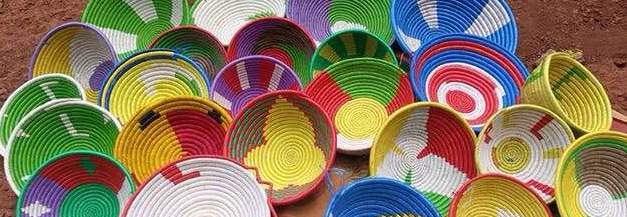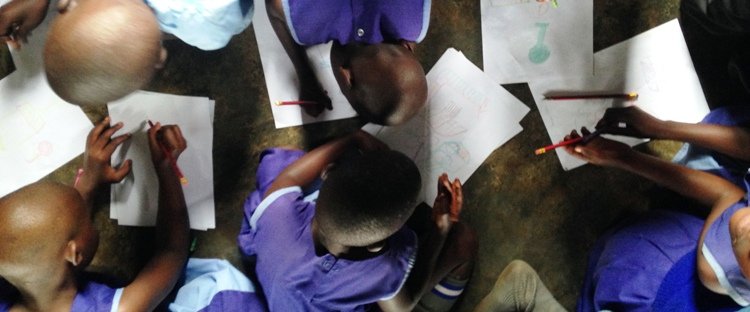Today’s post is meant for well-intentioned people who don’t know much about reality, here in Uganda. People who think Ugandans are suffering. People with ideas and technology that worked to develop their own economies, so believe they can be used to transform ours.
I hope to shed light on some appropriate and innovative home grown methods Ugandans use to live their lives in healthy and meaningful ways.
I’d love to open a discussion about this topic in the comments. If you have ideas to improve life in your own community through the use of technology, let us know.
We’ll let Ugandans decide if they can be adapted for local use.
The Real Uganda offers 2 – 12 week locally-led communty-based volunteer programs.

Read on to see if Ugandan innovations can be used to make your life easier.
1. banking and money lending
Banking fees and interest rates in Uganda are USURIOUS! Obtaining credit is the opposite of easy as collateral isn’t readily available.
Want to build a house? Ugandans with a few shillings in their pockets secure land, buy twine, bricks and cement, and start building. When they run out of cash, they stop. When they get a little more cash, they start again. No loan applications. No interest payments. No rush.
People don’t end up drowning in a sea of insurmountable debt. They don’t live beyond their means.
How many people in your community actually build their own house?


2. savings culture
Because Ugandans tend to take care of each other and are routinely called upon to contribute to all family functions, it’s very hard to simply open a bank account and slowly put away cash for a rainy day.
Instead, a group of colleagues or friends come together monthly, put an agreed upon amount of money on the table, and grant it to one of the group. The beneficiary can now do something big – buy household items, purchase stock for a side business, help out family in the village, or get building that new home! The next month, they do it again and someone else gets the windfall.
Solves a problem and moves people ahead. Perfectly appropriate.
3. marketing and consumerism
Ugandans are self-aware and confident people. They are not easily sold on new “must-have” products. Companies doing business in Uganda can’t play on self-esteem to make us believe our lives would be better if we lost weight, drank a certain brand of beer, or owned a huge flat screen TV.
We’re much too relationship-focused for that.
Ugandans also don’t celebrate by giving expensive gifts to everyone they know for every occasion. Little gifts for our sweetie is normal, but we tend to keep things within reason.
We’re not chasing after the next big trend, but supporting the people around us to simply enjoy life.
When someone in our group of friends has a bit of cash, she invites us all out and pays the bill. She wants to spend time with her cash-strapped friends more than she wants a new dress.

Our Girls Get Skills training program brings practical, transformative skills to young women in Uganda
4. childhood and parenting
Kids in Uganda are living a wonderful “old school” childhood. They play with little supervision and are largely peer or self-directed. They learn how to make decisions, treat others with respect, and take risks through play.
Ugandan parents don’t spend money on educational toys and exercise equipment. They throw the kids outside and let them sort s*it out. Parents don’t settle the kids into some “craft” so they can cook supper. The kids help cook supper.
This creates confident, civilized, and empathetic people. We’re actually quite outspoken about this topic at The Real Uganda and have written about it in the past.
If you know someone who lives outside of Uganda, who wants to adopt a Ugandan child, we MUST make them understand just how valuable (and appropriate) childhood in Uganda is.

5. clean water
Ha! This is a development aid hot topic. Have a look at this photo. Make you queasy? Can you imagine, someone actually came up with this campaign to sell their product?

“Lifestraw” removes 99.9999% of waterborne bacteria & filters up to 1,000 litres of water.
So what happens after those litres are filtered? Who is going to send her a new one? What is she going to drink in the meantime?
Where there is no piped national water, Ugandans work toward developing natural spring wells. The water is clean, ever flowing, and free.

Now here’s some appropriate technology. A properly built and maintained natural spring well.
We don’t, however, mind the odd fundraiser to pay for all the local materials and labour!
6. food security and nutrition
Not sure why, but people around the world don’t seem to know that Uganda has a 12 month growing season and little civil unrest.
We have food; lots of nutrient and carbohydrate dense food. It’s also largely pesticide free.
We breastfeed our babies (as best we can) and don’t need formula or to add western supplements to kids’ porridge – something I’ve seen encouraged by foreign companies, trying to dump their products on our economy. We’ve got something local for that: Enkejje (ground fish meal).
We also have jackfruit (it’s a superfood!) and more avocados than you can shake a stick at.
Most rural families have a small piece of land where they can grow much of what they consume. When they cook, they do it big and feed many people together.
This is not only efficient, but rather nice.

which of these Ugandan technologies could improve your life?
In the end, I don’t want you to walk away thinking Ugandans need to be left alone – not at all! In fact, most everyone here loves meeting new people. Let’s just keep it in the spirit of solidarity, not saving.
The Real Uganda prides itself on offering mutually beneficial cultural exchange and volunteering experiences. We learn from international volunteers, and they learn from us.
A great way to inspire the development of appropriate Ugandan technologies is to volunteer for a few weeks or months. Come, share ideas, and support local leaders in locally-led initiatives that transform lives in locally developed ways.
Here’s what our volunteers do. If you like what you read, apply today!











I honestly wish the U.S. worked like this. Why do we over complicate everything?? I’m actually a little embarrassed by many aspects of my culture, and hope I can wholly integrate in Ugamda’s beautiful one!